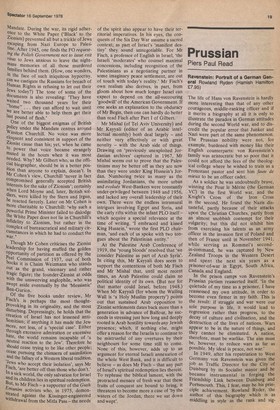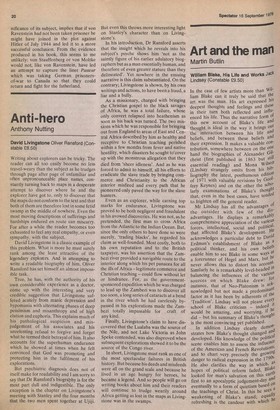Prussian
Piers Paul Read
Ravenstein: Portrait of a German General Rowland Ryden (Hamish Hamilton E7.95) The life of Hans von Ravenstein is hardly more interesting than that of any other courageous, middle-ranking officer and if it merits a biography at all it is only to illustrate the paradox in German attitudes during the second World war, and to discredit the popular error that Junker and Nazi were part of the same phenomenon. The Prussian nobility were not, for example, burdened with money like their English counterparts: von Ravenstein's family was aristocratic but so poor that it could not afford the fees of the theological college where he wished to train as a Protestant pastor and sent him faute de rnieux to be an officer cadet.
As a soldier he was undoubtedly brave, winning the Pour le /Write (the German VC) in the first World war, and the Knight's Cross of the Iron Cross in the second. He found the Nazis distasteful, partly because of their attacks upon the Christian Churches, partly from an almost snobbish contempt for their vulgarity; but this did not inhibit him from exercising his talents as an army officer in the invasion first of Poland and then of France until in November 1941, while serving as Rommel's second in-command, he was captured by New Zealand Troops in the Western Desert and spent the next six years as a prisoner-of-war in Egypt, South Africa, Canada and England. In the prison camps von Ravenstein's Prussian pietism reasserted itself. 'In the quietude of my time as a prisoner, I have reassessed my own attitude, in order to become even firmer in my faith. This is the result: if struggle and war were our sole purpose in life, it would lead to regression rather than progress, to the decay of culture and civilisation, and the destruction of the lives of nations. Wars appear to be in the nature of things, and they cannot be eliminated. A nation, therefore, must be warlike. The aim must be, however, to reduce wars as far as possible. My ideal is peace, not war.' In 1949, after his repatriation to West Germany von Ravenstein was given the job as Traffic Director for the City of Duisburg by its Socialist mayor and he became instrumental in forging the Friendship Link between Duisburg and Portsmouth. This, I fear, may be his principle achievement. Rowland Ryder, the author of this biography which is as middling in style as the rank and sig nificance of its subject, implies that if von Ravenstein had not been taken prisoner he might have joined in the plot against Hitler of July 1944 and led it to a more successful conclusion. From the evidence produced in his book, this seems to me unlikely: von Stauffenberg or von Moltke would not, like von Ravenstein, have led an attempt to capture the liner Pasteur which was taking German prisonersof-war to Canada so that they could return and fight for the fatherland.



































 Previous page
Previous page